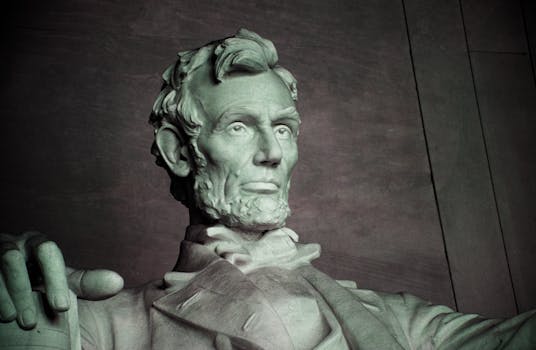The Life and Legacy of Abraham Lincoln

Abraham Lincoln, the 16th President of the United States, remains one of the most revered figures in American history. His leadership during the Civil War and his efforts to abolish slavery have left an indelible mark on the nation. Lincoln's life journey from humble beginnings to the highest office in the land is a testament to his determination, wisdom, and moral conviction. His legacy continues to influence contemporary discussions on equality, justice, and leadership.
Early Life and Education
Born on February 12, 1809, in a log cabin in Hardin County, Kentucky, Abraham Lincoln's early life was marked by poverty and hard work. His family moved several times before settling in Indiana. Despite limited formal education, Lincoln was an avid reader and self-educated himself through borrowed books. He developed a love for literature and law, which would later shape his career.
Lincoln's early professional life included working as a store clerk, rail-splitter, and postmaster. His interest in politics began to grow during this time, and he eventually became involved in local debates and political organizations. In 1834, he was elected to the Illinois State Legislature as a member of the Whig Party.
Political Career and Rise to Presidency
Lincoln's political career took a significant turn when he joined the newly formed Republican Party in the 1850s. His stance against the expansion of slavery gained him national recognition. In 1858, he debated Stephen A. Douglas during the Illinois Senate race, which showcased his eloquence and firm anti-slavery position.
In 1860, Lincoln was elected as the 16th President of the United States. His election was met with resistance from Southern states, leading to their secession and the onset of the Civil War. Lincoln faced immense challenges as he sought to preserve the Union while addressing the contentious issue of slavery.
The Emancipation Proclamation
One of Lincoln's most significant achievements was the issuance of the Emancipation Proclamation on January 1, 1863. This executive order declared that all enslaved people in Confederate-held territory were to be set free. The proclamation did not immediately end slavery but it fundamentally transformed the character of the Civil War by adding moral impetus to the Union cause.
The Emancipation Proclamation paved the way for the eventual abolition of slavery with the ratification of the 13th Amendment in December 1865. This bold move demonstrated Lincoln's commitment to human rights and equality.
Leadership During the Civil War
Lincoln's leadership during the Civil War was characterized by his strategic vision and steadfast resolve. He navigated complex military and political landscapes while maintaining focus on preserving the Union. His ability to communicate effectively with both military leaders and ordinary citizens helped bolster morale during difficult times.
Despite facing criticism and setbacks, Lincoln remained dedicated to his principles. His Gettysburg Address in November 1863 is considered one of the greatest speeches in American history. It succinctly reaffirmed the nation's commitment to liberty and equality.
Assassination and Legacy
Tragically, Abraham Lincoln's life was cut short when he was assassinated by John Wilkes Booth on April 14, 1865, just days after General Robert E. Lee's surrender at Appomattox Court House. Lincoln's death plunged the nation into mourning but also solidified his status as a martyr for freedom and unity.
Lincoln's legacy endures through numerous memorials, including the Lincoln Memorial in Washington D.C., which stands as a symbol of his enduring impact on American society. His leadership principles are studied by scholars and leaders worldwide.
The Enduring Influence of Abraham Lincoln
- Abolition of Slavery: The Emancipation Proclamation and subsequent 13th Amendment abolished slavery across America.
- Union Preservation: Lincoln’s efforts ensured that the United States remained unified following a brutal civil war.
- Civil Rights Legacy: His advocacy for equality laid foundational principles for future civil rights movements.
| Key Achievements | Impact |
|---|---|
| Emancipation Proclamation | Abolished slavery in Confederate states; paved way for nationwide abolition |
| Gettysburg Address | Reaffirmed national values of liberty and equality; strengthened resolve during Civil War |
| Preservation of Union | Maintained integrity of United States; set precedent for federal authority over states |
Historian Doris Kearns Goodwin delves into Abraham Lincoln’s leadership qualities that are still relevant today. Goodwin highlights Lincoln’s empathy, humility, resilience, vision, trustworthiness, and ability to unite people under a common cause as key attributes that modern leaders can learn from.
Abraham Lincoln’s life is a profound example of how dedication to principles like equality and justice can transform a nation. From humble beginnings to shaping pivotal moments in American history, his legacy continues to inspire generations. His leadership during one of America’s darkest periods underscores essential qualities that remain crucial for effective governance today.
The enduring lessons from Lincoln's presidency remind us that true leadership lies not just in power but in moral courage and unwavering commitment to what is right. As we reflect on his contributions, we are encouraged to uphold these values in our own lives and communities.